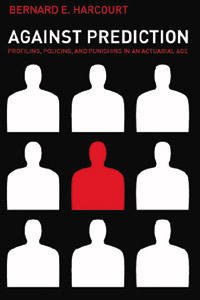Harcourt argues for more random approach to policing criminals
By Sabrina L. MillerNews Office
  Bernard Harcourt | |
According to Bernard Harcourt, Professor in the Law School, racial profiling may actually increase rather than decrease overall crime and have a ratchet effect on the prison population. In his new book, Against Prediction: Profiling, Policing and Punishing in an Actuarial Age, Harcourt argues that the use of random sampling instead of profiling is more equitable and possibly more efficient for the criminal justice system. Harcourt maintains that a randomized approach would create a vastly different criminal justice system.
The University Press will release Against Prediction, Harcourt’s third and potentially most controversial book, on Friday, Dec. 15. Harcourt, who specializes in criminal justice, said racial profiling itself is not the only problem; the problem is reliance on actuarial methods as predictors of crime because the actuarial methods can ultimately backfire and potentially increase crime. The book questions the mathematics of criminal profiling, and argues that even when profiling works—when prediction methods accurately predict offending—the overall effect may be an increase in crime and a ratchet effect on the prison population.
This effect is particularly true for racial minorities, Harcourt said, because they are profiled more often. As a result, Harcourt contends, relying on actuarial methods can aggravate difficulties racial minorities already have in terms of obtaining work, education and a better quality of life.
“I’m not assuming that profiling doesn’t work. I’m not assuming that it only operates on the innocent. I’m taking the hard case of a profiling mechanism that functions properly to identify correctly guilty people, and I’m demonstrating that it may actually backfire and cause more crime under very conservative assumptions about the relative elasticity of the different groups,” he said.
Harcourt argues that racial profiling can backfire and cause more crime if the targeted populations are not as responsive to policing as the non-targeted populations.
He offers a local example of police attempting to control drug use by targeting the heavily black South Side while forsaking the largely white North Side.
“That’s racial profiling, right? Actually, a lot of people would say that’s just criminal profiling and that there is no real problem. Here’s how it could increase overall crime: the black dealers may not be very elastic to policing—not very responsive because they have few employment alternatives. Their offending does not go down much,” Harcourt said.
Meanwhile, he said, drug consumption increases among North Side whites because there is less policing in the area.
“The total societal consumption of drugs would increase. You don’t get much impact of diverting the police to the South Side because the targeted population is not very responsive to the policing, but in contrast the others up North who are not being policed, or policed a lot less, violate drug laws more,” Harcourt contends.
Random sampling, said Harcourt—on highways, in airports and other circumstances—is the only way to achieve a prison population that reflects the offending population.
Harcourt is passionate about the effectiveness of random sampling because, he said, “I think that we have systematically and to our detriment ignored the tremendous benefits of randomness in the field of crime and punishment. “
The criminal justice system’s reliance on targeting and profiling rather than strong consideration of random sampling, Harcourt said, creates a larger problem.
“I think (random sampling) would fundamentally change the way we approach policing and sentencing. In this sense, it is a pretty radical departure from current practice,” Harcourt said. “A randomization approach would turn the present criminal justice system on its head.”
Author Malcolm Gladwell, whose books include the provocative Blink and The Tipping Point, wrote of Harcourt and his new book Against Prediction, “Bernard Harcourt has never had an uninteresting thought, or made an argument that does not provoke or engage or delight or enlighten—or do all those things simultaneously.”
![[Chronicle]](/images/sidebar_header_oct06.gif)